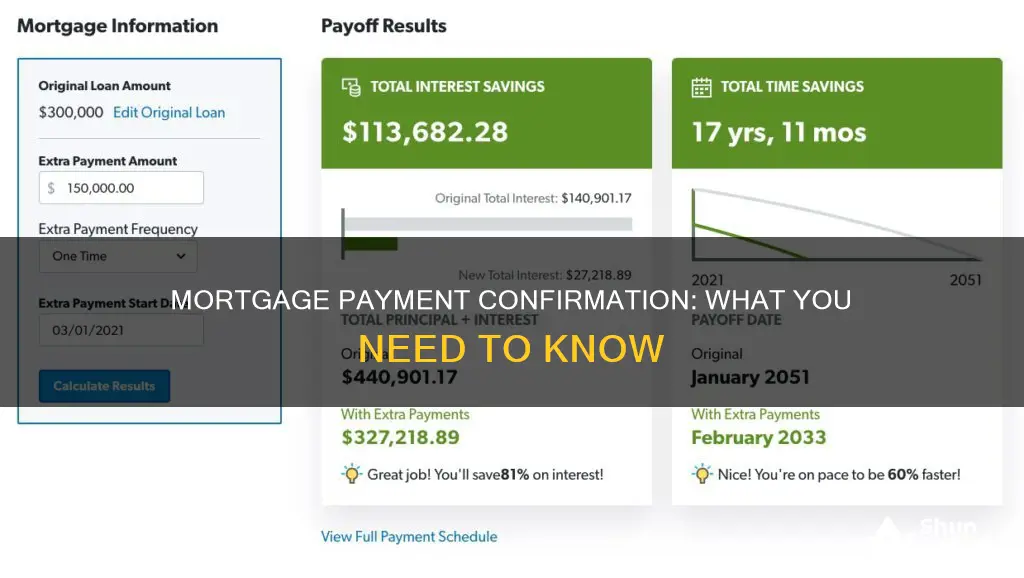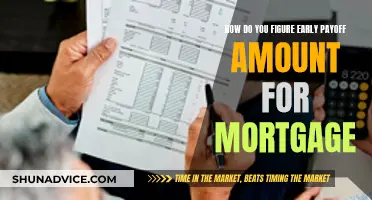
Paying off your mortgage is an exciting milestone, but it's not as simple as making your final payment. Once you've paid off your loan, there are a few things you need to do to make sure everything is in order. These include receiving certain documents from your mortgage lender or servicer, such as a statement showing that your balance is paid in full, and handling any escrow account refunds or budgeting for ongoing property taxes and insurance. Additionally, you may need to take steps to release the lien on your property, which can be done by contacting your local registrar's or county clerk's office. It's also worth noting that making extra payments towards your principal balance can help you save money on interest and pay off your loan faster, but some lenders may charge a prepayment penalty, so it's important to check beforehand.
| Characteristics | Values |
|---|---|
| No. of mortgage-free homeowners | 38.5% (as per the Census Bureau's 2022 American Community Survey) |
| Documents received | Canceled promissory note, loan payoff letter, deed of reconveyance, escrow funds, property deed, certificate of satisfaction |
| Documents to be retained | Canceled note, "lien satisfied" paperwork, property deed, certificate of satisfaction |
| Other actions | Contact homeowner's insurance company, budget for property taxes, check credit report |
What You'll Learn
- You will receive a statement from your mortgage lender confirming your balance is paid in full
- You will no longer have to make monthly loan payments to your lender
- You will need to pay your home insurance premiums and property taxes out of pocket
- You will receive any leftover money from your escrow account within 20 days
- You can use the money you were spending on mortgage payments for other purposes, such as saving or investing

You will receive a statement from your mortgage lender confirming your balance is paid in full
Paying off your mortgage is a huge milestone and a moment for celebration. Once you've paid off your mortgage, you will receive a statement from your mortgage lender confirming that your balance is paid in full. This statement is one of several documents that you will receive, and it is important to keep these documents safe. You may receive a cancelled promissory note, which is a document you would have signed at the closing, promising to pay back the amount of your mortgage. You may also receive a loan payoff letter, which will show the exact amount you have paid, including any interest or fees. A deed of reconveyance is another document you may receive, which confirms that your mortgage company no longer has a legal interest in your property.
Your mortgage lender should also return any money left in your escrow account within 20 days of you paying back your mortgage in full. You will then need to pay your home insurance premiums and property taxes out of pocket, so it is important to budget for these ongoing costs. You should contact your homeowner's insurance company and let them know that you have paid off your mortgage and that bills should be sent directly to you. You should also ask that any reference to the former mortgage holder be removed from the policy.
Once you have received confirmation that your mortgage is paid in full, you can retain the documents in a secure place, such as a safe or safe deposit box. You can also check your credit report to ensure that the mortgage satisfaction has been noted.
Employment Verification: A Crucial Step in Mortgage Approval
You may want to see also

You will no longer have to make monthly loan payments to your lender
Paying off your mortgage is a significant financial milestone. Once you've made your final payment, you will no longer have to make monthly loan payments to your lender. This means you will have more money to put towards other financial goals, such as saving and investing. It also means that you now have 100% equity in your home.
When you pay off your mortgage, you will likely receive paperwork from your lender or loan servicer confirming that you've made your final payment and releasing you from your mortgage obligation. These documents may include a cancelled promissory note, a loan payoff letter, a deed of reconveyance, escrow funds, a property deed, and a certificate of satisfaction. Keep these documents in a safe place, such as a filing cabinet or safe deposit box.
In addition to receiving these documents, there are a few other steps you should take after paying off your mortgage. First, contact your homeowner's insurance company and inform them that you've paid off your mortgage. Request that any reference to the former mortgage holder be removed from the policy and that bills be sent directly to you. You should also budget for ongoing property taxes and determine the timing of your tax payments. Finally, check your credit report to ensure that the mortgage satisfaction has been noted.
While paying off your mortgage is a cause for celebration, it's important to remember that you're not completely done managing your mortgage. There may still be some paperwork to organise and budgeting to be done. However, the hard work of making regular mortgage payments is over, and you can now enjoy the security of knowing that your home is fully paid for.
Obtaining Five Mortgages: A Comprehensive Guide
You may want to see also

You will need to pay your home insurance premiums and property taxes out of pocket
Paying off your mortgage is a huge milestone, and you'll want to make sure you've received the right documentation to prove it. Your lender or loan servicer will send you paperwork confirming that you've fulfilled your final payment and releasing your mortgage obligation. This will include a cancelled promissory note, which is a document you would have signed at closing, promising to repay the loan amount. You may also receive a loan payoff letter, which will detail what you needed to pay to settle the remainder of your mortgage, including any interest or fees. If you've paid everything off, this will be verified in the letter.
Another important document is the deed of reconveyance, which is a lien release confirming that your mortgage company no longer has a legal interest in your property. You should also receive any funds left in your escrow account, which your lender should send to you via check or direct deposit. The property deed is another crucial document, as it proves that you are the sole owner of the property. Finally, you may receive a certificate of satisfaction from your local recorder or county clerk, which shows that you've paid off the loan on your property.
It's important to keep these documents in a secure place, such as a safe or safe deposit box. Once your mortgage is paid off, you'll need to pay your home insurance premiums and property taxes out of pocket, rather than through an escrow account. Make sure you contact your homeowner's insurance company to let them know that you've paid off your mortgage and that bills should be sent directly to you. Ask that any reference to the former mortgage holder be removed from the policy. You'll also need to budget for ongoing property taxes and determine the timing of these payments, as some local tax authorities accept annual payments, while others expect quarterly remittances.
Assuming a Mortgage: Dealing with a Deceased's Debt
You may want to see also

You will receive any leftover money from your escrow account within 20 days
Paying off your mortgage is a huge milestone, and it's a moment to celebrate. However, it's also important to be aware of the specific steps you need to take once you've made that final payment. One of the key things to do is to ensure that you receive any leftover money from your escrow account.
An escrow account is used to pay homeowners insurance and property taxes while you're still paying off your mortgage. Once your mortgage is fully paid off, your lender should return any remaining money in your escrow account to you. This is because you will now need to pay your insurance and taxes directly, rather than through the escrow account. It is a legal requirement for your mortgage servicer to return these funds to you within 20 days of you paying off your mortgage in full.
The exact process for receiving this money may vary depending on your lender, but it's important to be aware of your rights and to ensure that you receive the funds you're entitled to. You can expect your lender to send you a check or direct deposit for the leftover funds in your escrow account. Make sure you keep an eye out for this payment and follow up with your lender if you haven't received it within the expected timeframe.
It's worth noting that, while you're no longer required to make monthly loan payments to your lender, you will still need to budget for ongoing property taxes and insurance premiums. These costs can add up, so it's important to factor them into your financial planning. Additionally, you may need to contact your homeowner's insurance company to update your policy and ensure that any reference to the former mortgage holder is removed.
Overall, receiving the leftover funds from your escrow account is an important part of the process of paying off your mortgage. By understanding your rights and staying organized, you can ensure that you receive this money promptly and can put it towards your new financial goals as a proud, mortgage-free homeowner.
Understanding Your Amortized Mortgage: What You Need to Know
You may want to see also

You can use the money you were spending on mortgage payments for other purposes, such as saving or investing
Paying off your mortgage is a significant milestone, and it's natural to wonder what to do next. Here are some detailed suggestions on how to utilise the money previously spent on mortgage payments for other important financial goals:
Saving for Retirement
Increasing your retirement savings is a wise move once your mortgage is paid off. Many people struggle to contribute adequately to their retirement funds while raising a family and paying off mortgages. However, with the mortgage out of the way, you can redirect the monthly payments towards boosting your retirement savings. This strategy can help you achieve a more comfortable retirement and make up for any previous shortcomings in your retirement fund contributions.
Investing
Another option is to consider investing the money. Without the burden of mortgage payments, you can explore various investment opportunities, such as investing in the stock market or other financial instruments. Investing can help you grow your wealth and potentially generate additional income, ensuring a more secure financial future.
Paying Off Other Debts
Focusing on paying off other high-interest debts is also a strategic financial move. Credit card debt, for example, can be a significant burden, and redirecting your funds to eliminate it can improve your overall financial health.
Building an Emergency Fund
Building an emergency fund is always a good idea. Life is full of surprises, and having a cushion of savings to fall back on can provide peace of mind and help you navigate unexpected expenses or financial setbacks.
Home Improvements and Maintenance
You might also consider using the money to make home improvements or necessary repairs. Maintaining and enhancing your property can not only improve your living experience but also potentially increase its value over time.
Remember, it's essential to reassess your budget and financial goals once your mortgage is paid off. Consult with a financial advisor or accountant to determine the best course of action for your specific circumstances, as they can provide personalised advice to help you make the most of your newfound financial freedom.
Filing Taxes Separately When Married With a Shared Mortgage
You may want to see also
Frequently asked questions
You can look up who owns your mortgage online, call, or send a written request to your servicer asking who owns your mortgage. The servicer is obligated to provide you with the name, address, and telephone number of the owner of your loan.
Your remaining loan balance is the amount you have left to pay on your mortgage loan. This is calculated by subtracting the amount you've paid from your original mortgage loan.
You can try real estate websites, which often display basic information about a property, like its assessed value and sales/listing history. You can also try a lien search, which can reveal mortgage information along with other liens against the property.
If you have paid off your mortgage, the cancellation of the security deed will be recorded. You can check this by searching for your city/state and then "registry of deeds".







